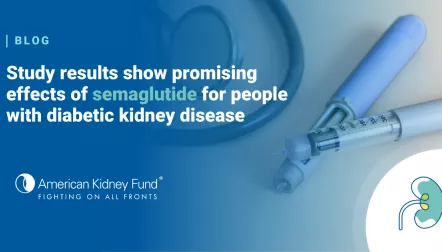
Blog post
What you need to know about CKM syndrome

On Oct. 9, the American Heart Association (AHA) published a presidential advisory in the journal Circulation that defined and officially declared the overlap of several health problems as a specific health condition called cardiovascular-kidney-metabolic (CKM) syndrome.
CKM syndrome is a condition in which a person has several health problems that overlap — one can cause the other and vice versa. In this case, the health problems are cardiovascular disease (which can affect both your heart and blood vessels), kidney disease, type 2 diabetes and obesity. The last two are metabolic diseases, which is where the "M" in "CKM" comes from.
These health problems may increase your chances of developing a heart-related disease, such as stroke, heart attack or heart failure. In fact, the most common cause of death for people with chronic kidney disease is cardiovascular disease.
In developing new screening guidelines, AHA divided CKM into stages assessing how many risk factors from across the health conditions a person has. There are five stages, ranging from Stage 0 (no risk) to Stage 4 (highest risk with confirmed heart disease). Find out more about the stages and the suggested treatments for them on our new webpage about CKM syndrome.
In the U.S., 1 in 3 adults have three or more risk factors that can lead to CKM syndrome. Risk factors include increased blood pressure, high blood sugar, excess body fat around the waist, high cholesterol or triglyceride levels (fat in the blood) and kidney disease — all of which increase your risk of cardiovascular disease, stroke and type 2 diabetes.
"The advisory addresses the connections among these conditions with a particular focus on identifying people at early stages of CKM syndrome," said Chiadi E. Ndumele, M.D., Ph.D., M.H.S., FAHA, in the AHA press release. "Screening for kidney and metabolic disease will help us start protective therapies earlier to most effectively prevent heart disease and best manage existing heart disease."
Screening for CKM can help detect cardiovascular, metabolic and kidney health changes early, identify social factors that affect health and stop CKM from advancing to the next stage. Social factors that affect people's lifestyle and wellbeing can include having access to nutritional food, opportunities to exercise and money to pay for medicines. If CKM syndrome is found early, you can start taking action to prevent it from progressing to the later stages, which puts you at an increased risk for serious health problems (like stroke, heart attack or heart failure) or deaths associated with them.
"This advisory is very timely and includes important changes to incorporate a new model where we think more about the risk factors," Dr. Dennis Bruemmer, doctor of cardiovascular medicine at the Cleveland Clinic, said in a Healthline article about CKM syndrome. "The guidelines have shifted to a more preventative care approach which I think is important. It's steering away from being a reactive model system to a more proactive system where we look at individual risk factors and how to treat risk factors earlier which ultimately will prevent complex diseases."
This new advisory only addresses care for adults. However, studies suggest CKM syndrome is progressive and can start in children. Therefore, the advisory agrees with the American Academy of Pediatrics' recommendations for health tests in children. They recommend that starting at age 3, children should have regular weight and blood pressure tests, as well as mental and behavioral health tests yearly.
The advisory encourages healthy lifestyle behaviors at every age and stage of CKM.
If you are concerned about your risk for CKM, talk with your doctor about these new screening and treatment recommendations. Here are some questions you can ask:
- Will slowing down the damage to my kidneys help lower my chance of having cardiovascular problems?
- What lifestyle changes can I make to improve my health?
- What medicines can help lower my risk of CKM syndrome?
Even though there is more to learn about CKM, this advisory raises awareness about the disease and can help people make educated health care decisions. If you are concerned about your risk for CKM, talk to your healthcare provider.
Visit the American Kidney Fund website for the latest on CKM syndrome and other topics relating to better kidney health.




